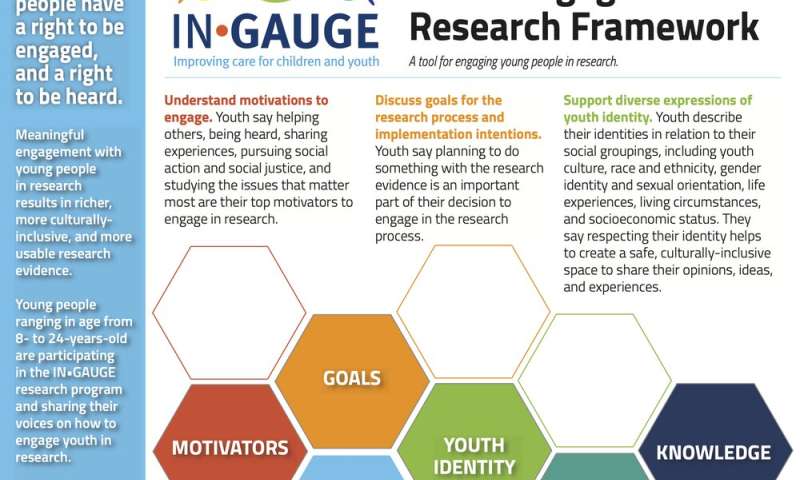
The issues and experiences that matter most to young Canadians right now might surprise you. They are ready to lead a new conversation.
My research interests have long focused on how the health and social issues of the day, such as the COVID-19 pandemic, are being experienced by young Canadians. Young people have a right to be engaged, and a right to be heard in research.
Curious about how this incredibly dynamic, vulnerable population could contribute to research, I discovered that among the most important lessons young people would have us learn is how best to engage them. This revelation led to the recently-established IN•GAUGE research program headquartered at the University of Manitoba.
Engaging young people
IN•GAUGE aims to improve the lives of children and youth by taking an innovative approach to research called integrated knowledge translation. This approach assumes that complex health and social problems are best explored, explained and solved in partnership with those who have the lived experience, and the power to influence change.
IN•GAUGE invites young people ages eight to 24 to join or form a research team and submit research topic ideas. But more importantly, the IN•GAUGE research program creatively engages young people in a research process of their own design.
https://youtube.com/watch?v=F9MjseqVhFc%3Fcolor%3Dwhite
When young people are engaged in the research process, results are deeper, richer and have more relevance. For example, using flexible, arts-based methods to gather research data from young people facilitates self-expression. It helps young people articulate, contextualize and make meaning of their lived experiences for a non-youth audience that may include educators, policy-makers or health-care and social service providers.
In a recent youth-led research study designed to relate the daily experience of living with anxiety, participants chose photovoice—a process that involves individuals taking photos to document their experiences—and performance art to share their stories.
The resulting research evidence showed that young people conceal certain aspects of their mental illness and avoid seeking help. This points to a gap in our understanding of their daily mental health experience and our approach to care.
https://youtube.com/watch?v=3fpsFfl7GBI%3Fcolor%3Dwhite
Fluid engagement
Young people in the IN•GAUGE research program are given the freedom to identify the research topics that matter most to them, and then to design and engage in research studies exploring those topics. Although issues related to capitalism, climate change, COVID-19, mental health, sex and gender were top-of-mind, these young Canadians were also interested in the way health and social research is being done.
To avoid ethical, feasibility and other barriers to conducting research with young people, researchers will often explore sensitive health and social issues without them. This leaves a significant gap in what we know about the experience of being young or coming of age in today’s world.
Young people participating in IN•GAUGE say this is a trap researchers need to avoid because meaningful engagement with young people in research gives rise to richer, more culturally inclusive and more usable research evidence.
https://youtube.com/watch?v=oHOfCYcwKJI%3Fcolor%3Dwhite
To help amplify the voices of young people in research, IN•GAUGE program participants have co-developed an important new tool that they are asking health and social researchers to start using as their guide: The Youth Engagement in Research Framework.
The Youth Engagement in Research Framework illustrates how youth say researchers can create a culturally inclusive research environment, how to meaningfully engage them in research, which conditions should be met throughout the research process and what they hope to get out of their experience.
IN•GAUGE research evidence shows that at least seven fluid, adaptive engagement concepts are critical to the meaningful engagement of children and youth in research:
- understanding their motivations to engage,
- discussing goals for the research process and implementation intentions,
- supporting diverse expressions of youth identity,
- addressing facilitators and barriers to engagement,
- reinforcing the choice to engage in research,
- building trusting relationships, and
- respecting different forms of knowledge.

Understanding young people and their take on current events has the potential to make the future more predictable, or at least more relatable. As we learn about youth culture and their social norms, we can better understand their shifting social values, make reasonable forecasts about the wants and needs of the population, and start adapting our health and social systems.
Source: Read Full Article
